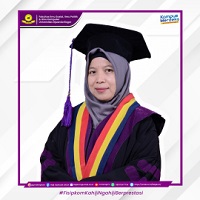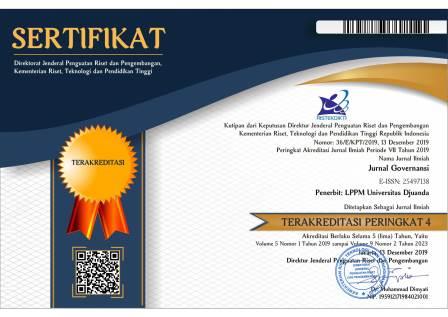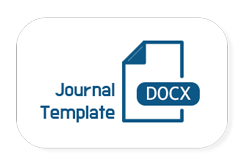EVALUASI PROGRAM KELUARGA HARAPAN (PKH) DI KECAMATAN BOGOR SELATAN KOTA BOGOR
DOI:
https://doi.org/10.30997/jgs.v4i1.1140Abstract
The purpose of this study is to know the Keluarga Harapan Program (PKH) in Bogor Selatan District Bogor City. The theory used in this research is by using policy evaluation of William N. Dunn which states that to measure the success of a program evaluation can be measured through six variables namely: effectiveness, efficiency, adequacy, equity, responsiveness, accuracy.
The method used is descriptive analysis using Qualitative approach. While the data analysis technique used is by using Interactive model developed by Miles and Huberman, which includes data reduction, datadisplay, and conlusiondrawing / verification. Data collection techniques used were interviews, direct observation and documentation. The informants that the researchers took were 2 kinds of informants, the first PKH assistant who was taken by 2 persons, namely the active companion and the less active companion, and the second informant, the PKH participant who was taken 3 people, the participants who had long been the PKH participants, just become PKH participants and participants who complete the PKH component.
The result of this research can be concluded that the process of PKH implementation has been running well in accordance with the purpose of launching PKH in the hope of solving the classical problems faced by RTSM such as malnutrition, high maternal and infant mortality and low participation of school age children. The target achieved in the implementation of family planning program (PKH) in the district of South Bogor is in the form of the incapability of the community is not able especially RTSM in meeting the needs of life related to education, health of pregnant women and toddlers.
Keywords: Evaluation, Program, Poverty.
References
1. Bogor dalam Angka 2016
2. Kecamatan Bogor Selatan dalam Angka
3. Statistik Daerah Kecamatan Bogor Selatan
Dinas Sosial Kota Bogor :
1. Buku Pedoman Program Keluarga Harapan (PKH) 2015
2. Laporan Evaluasi Program Keluarga Harapan Tahun 2014 - 2016
Sumber Buku :
1. Nugroho Riant, 2003. Kebijakan Publik (Formulasi, Implementasi, dan Evaluasi). Jakarta : PT Elex Media Komputindo
2. William N. Dunn, 2013. Pengantar Analisis Kebijakan Publik. Yogyakarta : Gadjah Mada University Press
Sumber Jurnal :
1. Jurnal Skripsi, Evaluasi Program Keluarga Harapan (PKH) Tahun 2013 Di Kelurahan Hintoro Kecamatan Patrang Kabupaten Jember oleh Susnaini, Universitas Jember, Fakultas Ilmu Sosial dan Ilmu Politik, Jurusan Ilmu Administrasi Negara, Tahun 2014.
2. Jurnal Skripsi, Evaluasi Pelaksanaan Program Keluarga Harapan (PKH) Di Kelurahan Saruni Kecamatan Majasari Kabupaten Pandeglang oleh Edwin Satria Permana, Universitas Sultan Ageng Tirtayasa Serang, Fakultas Ilmu Sosial dan Ilmu Politik, Jurusan Ilmu Administrasi Negara, Tahun 2012.
Sumber Internet :
• Rainday Affairs, 2015
http://www.landasanteori.com/2015/10/pengertian-kebijakan-publik-dan.html
• Aris Kurniawan, 2014
http://www.universitasgunadarma.com/kemiskinan-dan-solusinya.htm,
• Artikel PKH, 2008
http://www.tnp2k.go.id/id/tanya-jawab/klaster-i/program-keluarga-harapan-pkh
Downloads
Published
How to Cite
Issue
Section
License
Authors who publish with Jurnal Governansi agree to the following terms:
- Authors retain copyright and grant the journal right of first publication with the work simultaneously licensed under a Creative Commons Attribution 4.0 International License that allows others to share the work with an acknowledgement of the work's authorship and initial publication in Jurnal Governansi.
- Authors are able to enter into separate, additional contractual arrangements for the non-exclusive distribution of the journal's published version of the work (e.g., post it to an institutional repository or publish it in a book), with an acknowledgement of its initial publication in Jurnal Governansi.
- Authors are permitted and encouraged to post their work online (e.g., in institutional repositories or on their website) prior to and during the submission process, as it can lead to productive exchanges, as well as earlier and greater citation of published work.



















